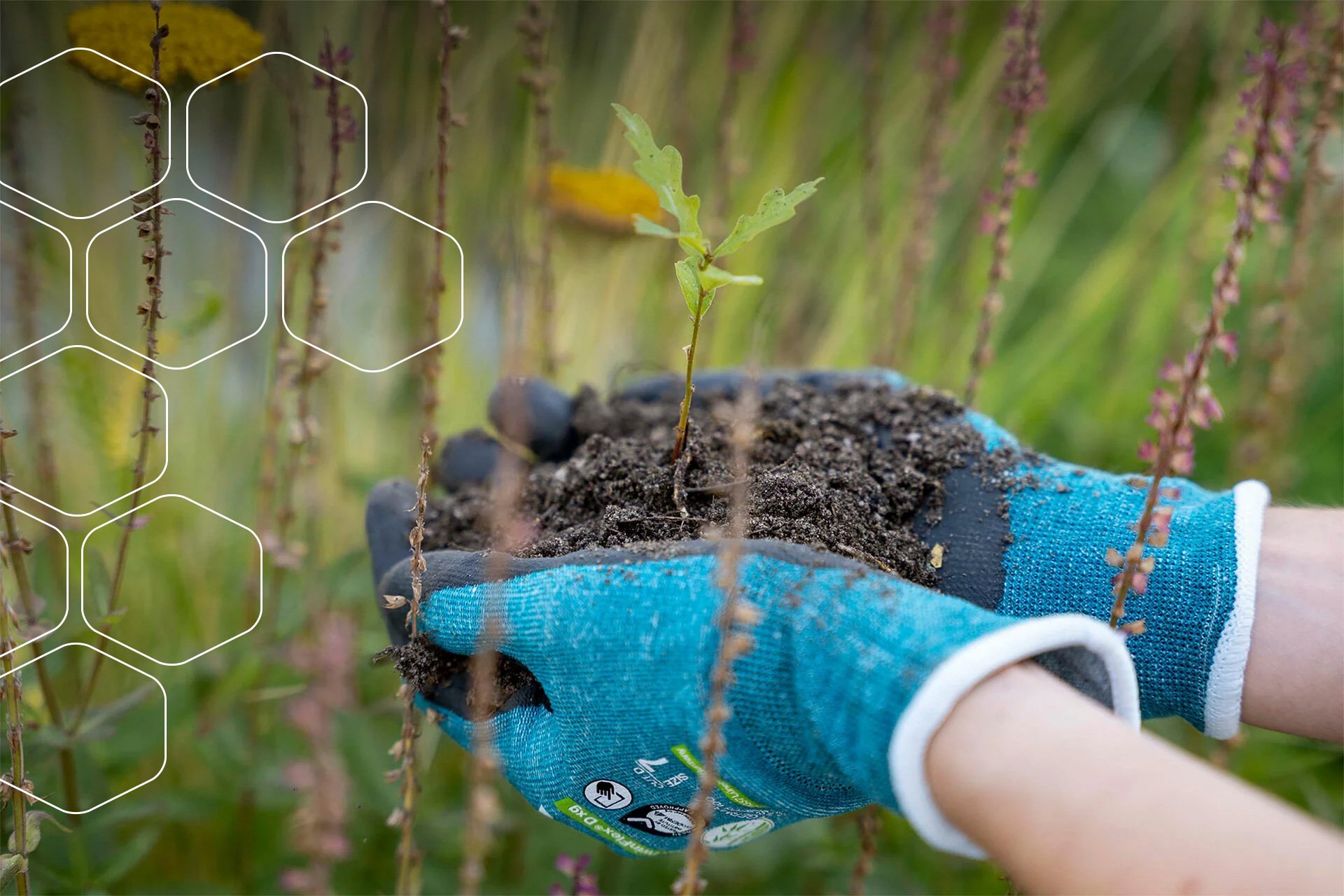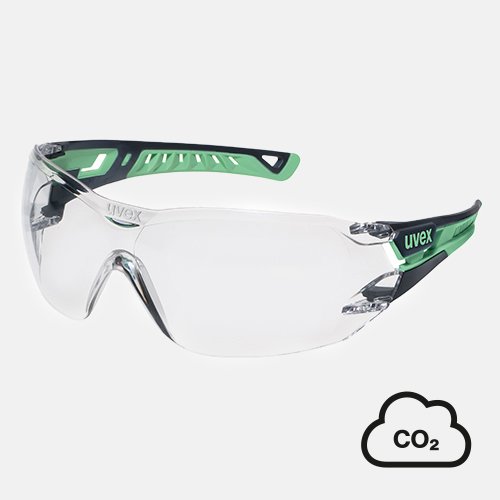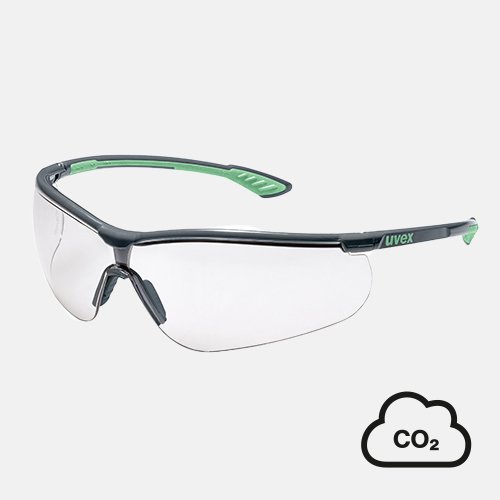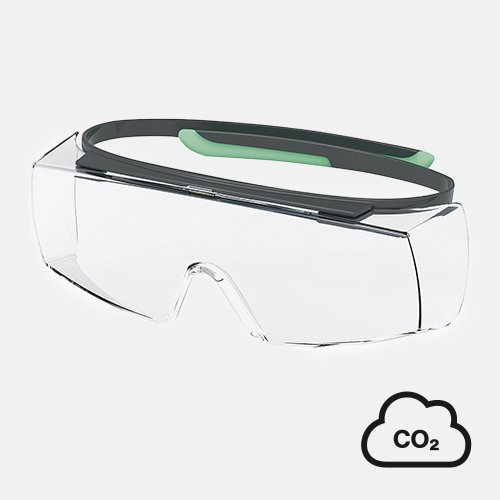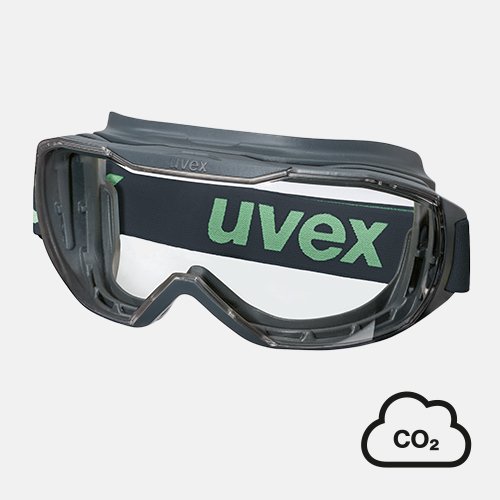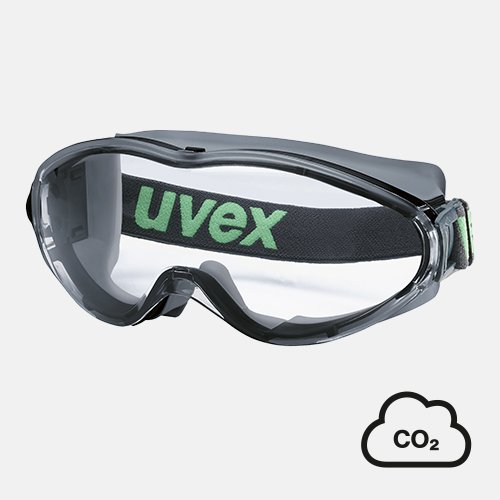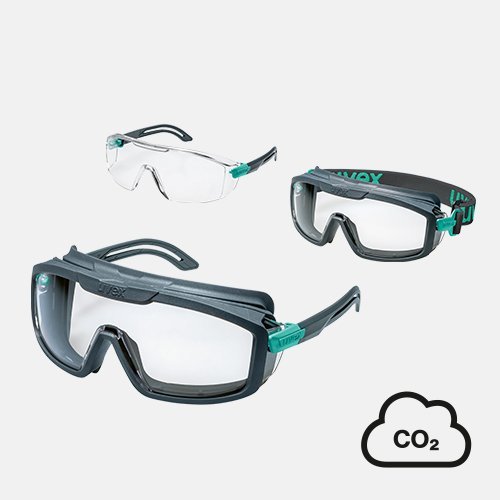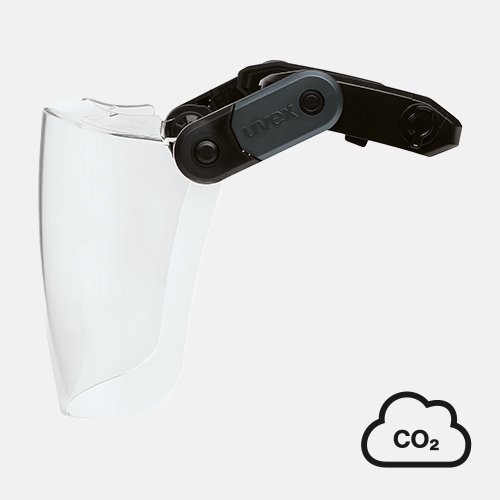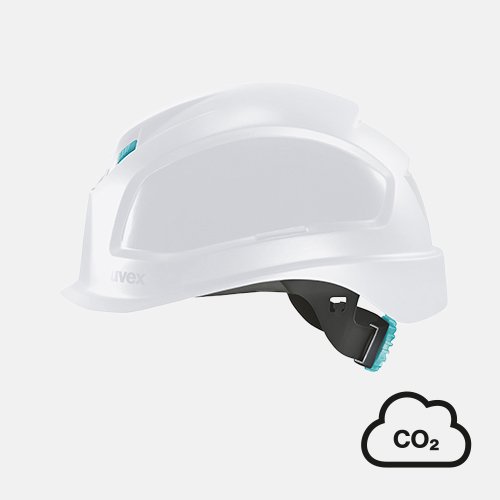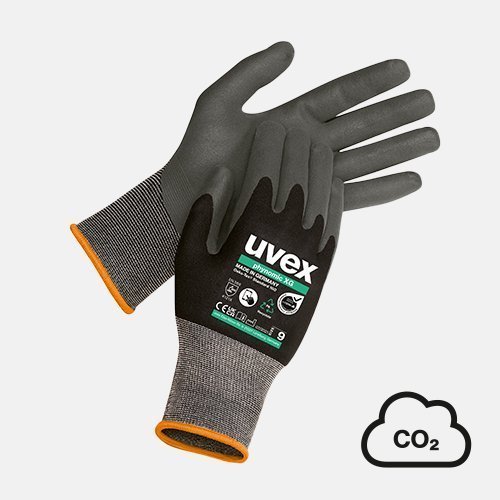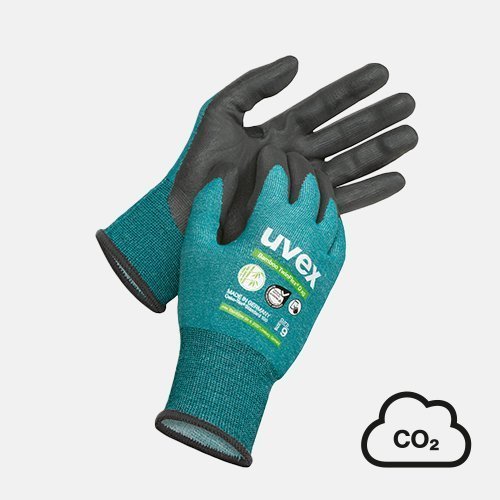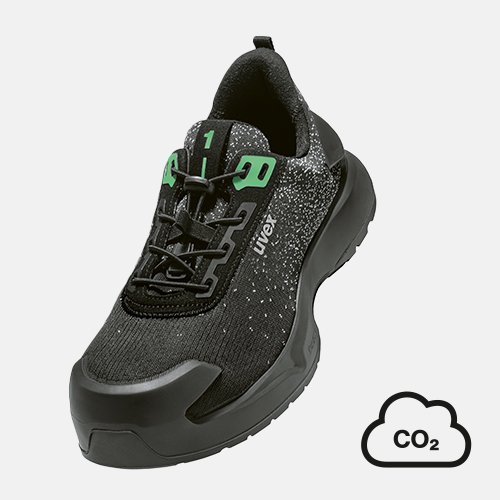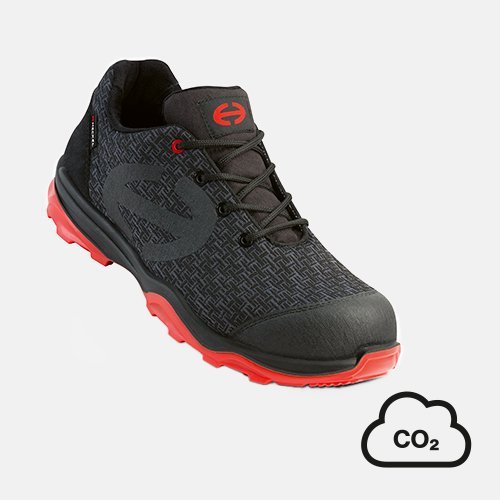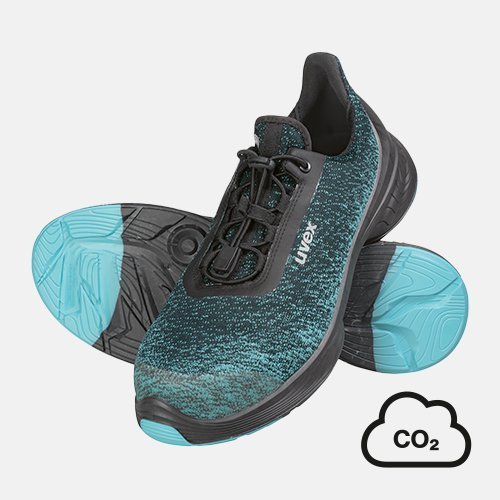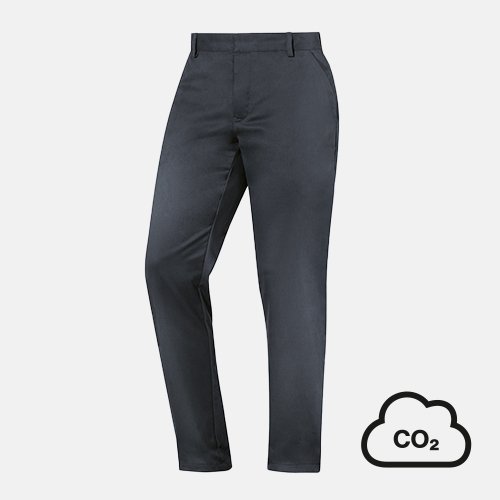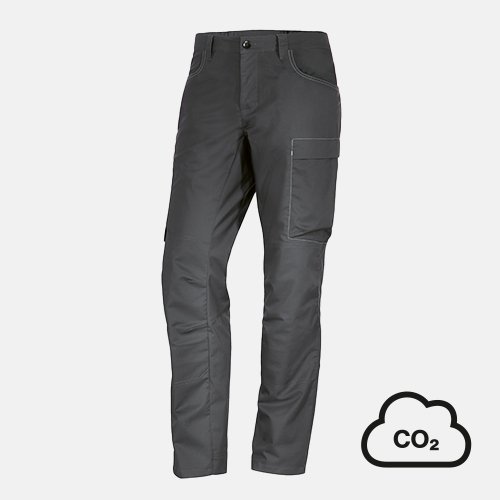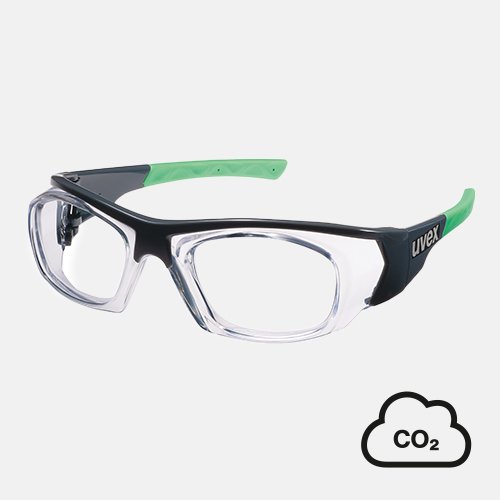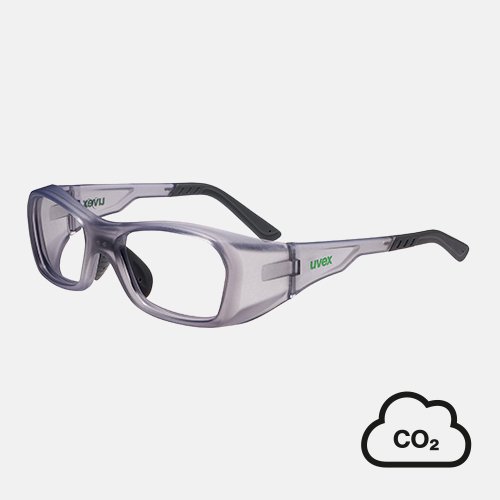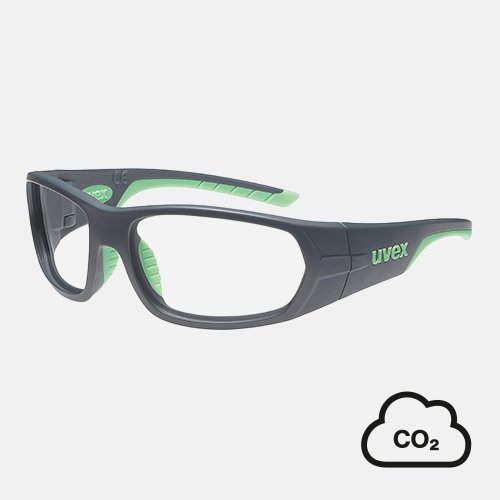#protectingplanet – uvex protects people and the planet
uvex’s corporate mission of "protecting people" is more relevant than ever!
uvex’s commitment to protecting people also includes responsibility with respect to society and the environment. As a family business, sustainability has been at the forefront of the company‘s thoughts and actions for many years.
uvex has set itself ambitious goals in terms of the environment, the economy and society. In its manufacturing facilities, uvex is working hard to increase energy efficiency and doing everything it can to become carbon-neutral in the near future.
High quality standards for products are combined with the development of recycling concepts and the use of more sustainable materials (such as bio-based and recycled materials). The durability and long service life of uvex products helps to reduce waste and conserve resources.
uvex also focusses safeguarding health and the environment. We stand for sophisticated pollutant management with the aim of impacting people’s health and the environment as little as possible. In FY 22/23, for example, 50,000 tests for harmful substances were carried out at a cost of 600,000 Euros.
Under the motto "protecting planet", uvex is presenting a complete product system of environmentally friendly products for the first time.
Discover our sustainable uvex products:
Safety glassesHearing protectionHead protectionRespiratory protectionSafety glovesSafety shoesWorkwearIndividual PPE
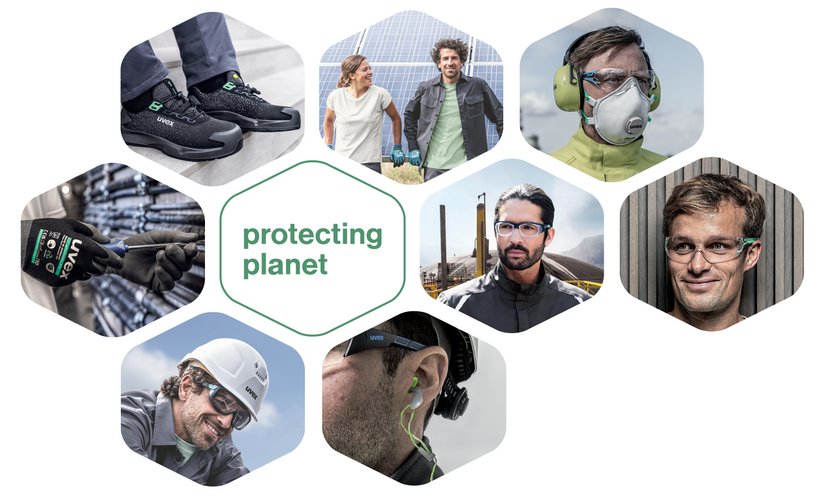
Our sustainable safety glasses

Recycled materials
› side arms made from recycled material (hard component: 65 percent, soft component: 47.4 percent)
› lens made from 100 percent mass-balanced polycarbonate**

Environmentally-friendly packaging
› films of polyester bagsup to 70 percent recycled material from production waste
› cartons made of over 90 percent recycled paper

Environmentally-friendly production
› paper for instruction manuals: 30 percent reduction
› Packaging units: increase from 5 to 10 pairs of spectacles reduces packaging material and causes less waste
Our sustainable hearing protection

Recycled materials
› ergonomically shaped stems made from 100% recycled polypropylene (PP)
› oval-shaped foam earplugs: strictly controlled production, maximum reduction of pollutants

Environmentally-friendly packaging
› packaging made from 100 percent recycled cardboard

Environmentally-friendly production
Production at SwedSafe, Sweden
› part of the uvex group
› small carbon footprint
› no consumption of fossil fuels
› electricity from 10% renewable energy sources
› certified in accordance with Environmental Management ISO 14001
› promoting biodiversity at the site: creation of insect habitats by planting natural grass landscapes and sowing additional flowering plants
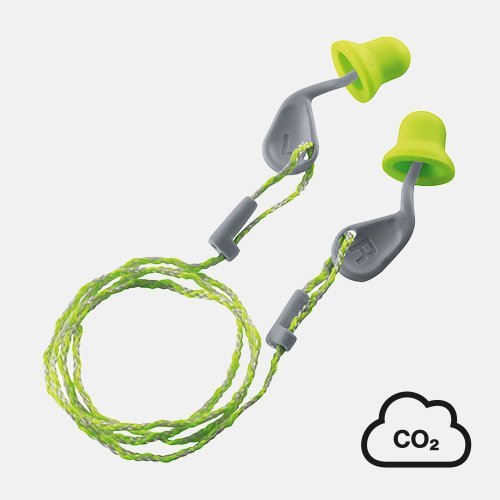
0.021 kg CO2e – Calculation date: 09/2023*
Buy now
Our sustainable head protection

Recycled materials
Visor system
› visor lens made of up to 100 percent mass-balanced** polycarbonate
› visor arms made of up to 85 percent recycled plastic (made of high-quality post-industrial and post-consumer materials)
› reduction in CO2 emissions by over 50 percent

Environmentally-friendly packaging
› instructions for use made from waste paper
› Packaging: CO2-offset polybag; clean disposal and return to the recycling process possible
Our sustainable respiratory protection

Recycled materials
› valve made from 95 percent recycled ABS
› headband attachment made of 100 percent recycled PP
› recycled ABS made of components from e.g. the automotive industry or white goods
› recycled PP comes, for example, from used household appliances
› total recycled content of the mask is 26.5 percent
› significant improvement of the CO2 footprint to 0.18 kg per mask

Environmentally-friendly packaging
› polybag made of 30% recycled material
› cartons made from more than 80% recycled paper
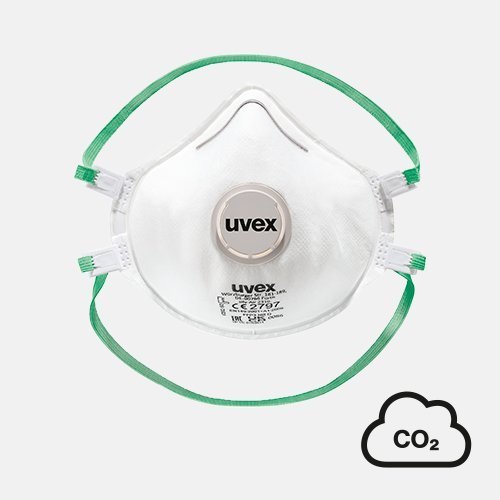
0.18 kg CO2e – Calculation date: 05/2023*
Buy now
Our sustainable safety gloves

Recycled materials
› Polyamide recyclate: more than 50% based on polyamide waste from the fibre manufacturer (polyamide recyclate)
Health
› skin compatibility dermatologically approved by the proDerm Institute
› exceeds REACH regulations

Environmentally-friendly packaging
› minimisation of packaging (only outer carton and sleeve)
› 80% paper sleeve made of FSC-certified kraft paper
› no polyester bags

Carbon-neutral production at the Lüneburg site
Certifications
› Environmental management ISO 14001
› Energy management ISO 50001
Production
› CO2 neutral, based on emissions resulting directly from production. Using electricity from 100 percent renewable energy sources since 2014.
› promoting the construction of new plants for renewable energies in the region.
Offsetting
› operating the highly efficient CHP at our site using green gas
› offsetting the resulting CO2 emissions
› investing exclusively in approved certified climate protection projects (Gold Standard or VCS — Verified Carbon Standard)
› promoting, for example, the construction of new plants in India for the generation of solar and wind power
Our sustainable safety shoes

Recycled materials
› Upper: 100% recycled polyester made from PET bottles
› Textile penetration resistance: 100 percent recycled fibres
› Distance mesh lining: 52% recycled polyester and 18% bamboo fibres
› Comfortable climatic insole: 73% recycled PU foam and 85% recycled polyester
Health
› produced in accordance with the provisions of the REACH regulation and beyond, according to the specifications of the uvex banned hazardous substances list

Environmentally friendly packaging
› Shoe boxes: 90% recycled cardboard, 100% recycled tissue paper
› Instructions for use: 100% recycled paper

Environmentally friendly production
› Certifications: Environmental Management ISO 14001 (since 2017)
› Production: exclusively with green electricity and green gas, use of a photovoltaic system, continuous optimisation of the cleaning and injection process
Waste prevention
› Continuous process and tool optimisation to reduce PU waste
› uvex i-PUREnrj planet midsole made of 15 percent granulated and recycled PU surplus that cannot be prevented
Our sustainable workwear

Bio-based materials
› all K26 planet products are made from natural fibres
› from hemp, maize, bamboo and algae, through to the already well-known organic cotton and lyocell
› the accessories used are also of natural origin: bamboo buttons and a uvex logo badge made of apple leather

Environmentally friendly packaging
› individual packaging in polybags made from post-consumer waste

Environmentally friendly production
› use of renewable energy
› short transport routes and less environmental impact thanks to being 75 percent produced in Europe
› little water is used in the cultivation and production process of hemp and algae
Our sustainable individual PPE

Material and health protection
› the frame is mostly made of high-quality, bio-based material
› instead of crude oil, the base is made of the renewable raw material from the castor plant
› 38 percent of the frame is based on castor oil
› castor cultivation does not compete with food growing areas or endanger forested areas
› no harmful ingredients
› produced in accordance with the provisions of the REACH regulation and beyond, according to the specifications of the uvex banned hazardous substances list

Durability
› uvex prescription safety spectacles are characterised by their durability
› the average service life is 1.5 years, which saves valuable resources and reduces CO2 emissions

Environmentally-friendly packaging
› uvex prescription safety spectacles are supplied with a case to extend the service life
› the case can be reused after its useful life
› this means we are making an important contribution to the prevention of packaging waste
Sustainability at uvex: a promise to people and the environment
"protecting people" is the mission behind all uvex group brands.
The aim is to offer people exactly the right protection they need with uvex products. Protection in this regard takes on meaning in a wider social, ecological and economic context. protecting people therefore naturally leads to protecting planet, i. e. expanding this promise to include protecting society and the environment. To communicate these numerous measures, a concept has been developed that describes the uvex group's sustainability projects with concrete statements.
Examples of the protecting planet concept:

In order to conserve resources and protect the environment, the uvex group processes various types of recycled materials. These include, for example, recycled polyamide from production surplus and recycled PET plastics from drinking bottles, which in turn are used to manufacture frames for our safety glasses and eyewear products, headbands, as well as reading glasses made from at least 70% post-consumer recyclate.

The uvex group does not use any substances hazardous to health in accordance with the REACH regulation and has also enforced its own list of restricted substances. It is the policy of the uvex group to only offer products that contain as few harmful substances as possible and that do not pose a risk to either the user or the environment. The uvex safety group applies the strictest criteria which exceed the applicable EU directives, particularly for products that come into contact with the wearer's skin, such as PPE.

To protect the environment, the uvex group works to cut waste at as many different places as possible. To this end, we regularly scrutinise the use of resources in our production facilities on site in order to verify to what extent procedures and processes can be improved. The first specific example of a measure we are implementing in this context is a concerted effort to reduce cardboard material by changing packaging sizes and reusing shipping boxes. In the case of trade fair equipment, the uvex group also relies on loan concepts – this guarantees that the materials can be reused by other companies at a later date.

Environmental protection starts with electricity. For this reason, the uvex group uses green energy across its locations in Germany. This also applies to the locations of uvex safety Cagi in Italy, Swedsafe in Sweden and Heckel in La Walck (Alsace), France. ISO 50001 obliges the uvex group to verify that it has made continual energy savings. However, the uvex group does not simply rest on its laurels there: saving electricity along the value chain also has a high priority. The uvex group ensures sustainable production by continuously implementing sustainability measures at its own production facilities around the world. Individual measures include, for example, LED lighting, state-of-the-art machinery and heat recovery processes.

The uvex group believes that plant and bio-based materials represent the future. For this reason, bio-based HDPE (high density polyethylene) made from sugar cane, Lavalan (pressed wool), Prolan (pressed Bavarian sheep’s wool), rapeseed oil-based PU foams, textiles made from recycled PET bottles in addition to bamboo fibres, bio-based polyamide and other plastics developed on the basis of castor oil are already used in a wide variety of uvex products.

The uvex group stands out from the competition by offering improved product quality that can be empirically verified. This can be seen in the coatings used for our safety glasses, for example. Accordingly, uvex group customers have to buy new products less often because the products can withstand everyday use for a longer period of time. This not only saves money over the long term; it also saves valuable resources and generates less waste.

The uvex group has set itself the goal of continually reducing its own CO2 emissions across various levels. For example, within Germany the uvex group sources green energy on the basis of 100% renewable energies in addition to CO2-neutral gas. In so doing, the uvex group uses infra fürth gmbh to offset CO2 emissions produced by gas combustion processes and supports climate protection projects. Innovative products are produced and services for the global market offered at uvex’s own production plants, many of which are located in Germany and Europe. This firstly guarantees high quality, while also ensuring that transport routes are kept as short as possible. The uvex group makes a key contribution to reducing its ecological footprint by regularly implementing sustainability activities at its production facilities.

As part of its sustainability strategy, the uvex group has defined a target of continually increasing the proportion of environmentally friendly packaging it uses. In this context, for example, climateneutral (a status achieved with the use of offsetting measures achieved by way of climate protection projects) and 100% recyclable packaging is used, which is occasionally even plant-based in the form of grass-based cardboard. Further examples include the use of grass and stone paper in addition to recycled packaging film and bags made from renewable raw materials such as Tencel.
The protecting planet label can be found in various places: for example, on products and their packaging, at trade fair stands and in uvex group catalogues. With this approach, uvex wants to not only emphasise its commitment to these areas of sustainability, but also raise awareness of environmentally friendly and socially responsible business practices.
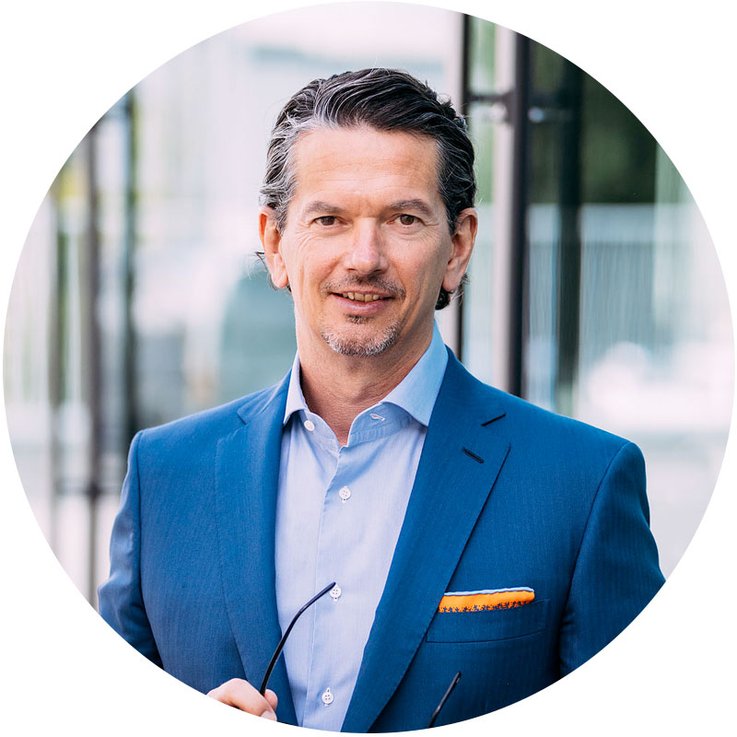
We have been protecting people in sports, leisure and at work since 1926. "protecting people" is our mission.
"protecting planet" is the natural continuation of this mission when it comes to treating people, society and nature responsibly.
With protecting planet, we have created a concept that offers maximum transparency and information about our sustainability activities: from resource-saving products and innovative measures in our factories through to social commitment and social projects.
Michael Winter, Managing Partner of the uvex group
* Information: Values are rounded to two decimal places • Calculation of transport: Transport of the product incl. sales surcharge of the product group - Calculation method: IPCC 2021 GWP 100a (based on ISO 14067) SimaPro with corresponding databases. These CO2 values are valid at the time of calculation and may be subject to change. • Scope: cradle-to-customer • Unit: kg CO2e
** Mass balancing is a bookkeeping method that is used to record and track the mass flows of plastics, for example, along the entire value creation chain. In the manufacturing process, some fossil-based raw materials are replaced by more sustainable alternatives, for example through the use of biomass or recycled raw materials. The mass balancing approach enables manufacturers to verify the use of bio-based raw materials or recycled materials within a balance sheet period and to mathematically allocate the bio-based or recycled content to a proportion of the plastics produced, resulting in a material with a significantly lower carbon footprint. However, the exact proportion of bio-based or recycled materials in the end product can no longer be precisely determined.
At uvex, mass-balanced material is used, for example, in the lenses of the planet models, enabling a significant reduction in their carbon footprint. By purchasing mass-balanced polycarbonate, uvex is helping to replace fossil-based raw materials with bio-based materials.
